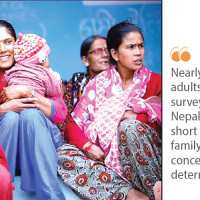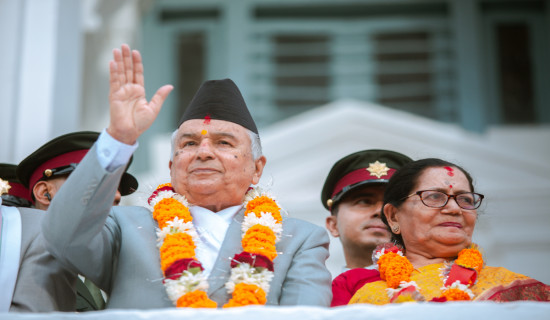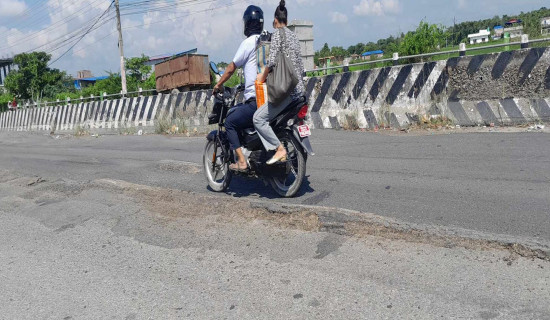- Sunday, 7 September 2025
Powerful Portrayal Of Caste Struggles
Even before watching the movie, one can guess that Pujar Sarki is all about caste discrimination and its impact on the so-called lower caste population. The film starts with a scene where Maita (Pradeep Khadka) meets his lover, Gaumaya (Parikshya Limbu), in the pitch-dark night—an ideal time for the duo to deceive Gaumaya’s father, who is against their union. Maita is a funny, likeable character who expresses everything straightforwardly, although his bitter remarks sometimes annoy others. Gaumaya’s family belongs to the Magar caste, and her father would have easily agreed to the marriage had Maita belonged to a higher caste. Maita’s old father often mentions that he rescued Maita, who was left at a Chautari when he was small.
The Damai man travelled to a distant village and returned home with a baby, who became a Damai himself after being looked after by the Damai couple. Upon constant rejection by Gaumaya’s father, Maita laments that he would have had the chance to marry Gaumaya if someone from a higher caste had taken him home when he was discarded as a baby. This scene poignantly underscores the low self-esteem that Dalit people always live with.
In a temple where Maita plays Damaha to start the ritual proceedings every day, Pujar (Aryan Sigdel) comforts Maita by telling him that one should not feel inferior because of the caste they belong to. Pujar is a learned Brahmin who performs pooja in the village’s temple daily. In his bid to console Maita, Pujar stresses that even a lower-caste person can become a ‘Brahmin’ if they read the holy books thoroughly. Maita gets excited and starts skimming holy books given by Pujar, but the head of the village objects, and Maita finally gives up. The film effectively portrays the caste discrimination embedded in society from time immemorial. The movie picks up pace when Maita discovers the love affair between Pujar and a girl called Maiya (Anjana Baraili), who belongs to a lower caste. Pujar’s character and his affair with Maiya add a layer of complexity to the narrative.
Things get interesting when Maita playfully threatens Pujar, telling him that he will keep quiet about the relationship if Pujar convinces Gaumaya’s father to let Maita marry Gaumaya. “You are a dignified man, and who wouldn’t listen to you?” says Maita. However, Pujar’s dignity tarnishes soon after the village discovers that he is planning to marry a lower-caste girl. Maiya, too, becomes a matter of insult and a burden to society. According to societal norms, she has done an unacceptable thing by attracting a man from a higher caste.
In these times of difficulty, an ideologist steps in, promising to become a messiah for the oppressed and lower-caste people. The ideologist with a radical mindset is Meghe (Paul Shah). Meghe becomes the favourite character of Maita and Maiya after he promises them that he will break the caste stereotype so that both Maita and Maiya can marry their respective lovers from the higher caste. Meghe’s far-sighted vision to change society through politics sounds alien to both Maiya and Maita. A bit of politics and snippets of the Maoist insurgency make the movie more social and realistic. In the tussle between the police and the Maoist revolutionary, Meghe’s mother gets killed, but he remains firm in his pursuit of an ideal society where discrimination doesn’t exist.
The film effectively captures the woes of lower-caste people and their desperation for societal validation. When Pujar goes against societal norms to marry Maiya, it emits a glimmer of hope, sending a positive message to society. Yet when Pujar is restrained from performing pooja in the temple, the film conveys that society is still not ready for change. Previously, Gaumaya’s father had made a deal with Maita that if Pujar married Maiya, he would also let Maita marry Gaumaya.
However, Gaumaya’s father intends to fix her marriage with someone else, shattering Maita to the core. Maita goes to Pujar’s house and requests that he speak to Gaumaya’s father on his behalf. Pujar reluctantly goes to Gaumaya’s house, knowing that no one will heed his words after marrying Maiya. When they arrive, the potential groom is already there. After a heated discussion, both Pujar and Maita are chased away by Gaumaya’s father, the potential groom, and later joined by the entire village. The chase ends with the brutal murder of Pujar and Maita. Later, Meghe stands before the corpses, reminiscing about the talks he had with Pujar and Maita when they were alive. The brutal murder of Pujar and Maita depicts the extreme cruelty and unwillingness to end caste discrimination.
The most beautiful part of the movie is when Pujar registers his name as ‘Pujar Sarki’ shortly after his marriage for the issuance of a citizenship card. The brutal murder of the two protagonists is an honest depiction of the society we live in. The last scene in the movie is extremely touching. Twenty years after the brutal murder of Maita and Pujar, Meghe takes to the streets of Kathmandu, rallying for social equality. Sadly, the police detain him, and his loud protests echo in the background, sending a hopeless message that inequality prevails even after many political and social changes in the country.
The film couldn’t have been portrayed more honestly, thanks to the stellar performance by Pradeep Khadka. Aryan Sigdel and Paul Shah didn’t have to go out of the box as the movie demands regular acting from them, but Pradeep Khadka should be lauded for taking on such a demanding role.
While the audience might feel the movie should have ended on a happy note, the director's daringness to depict the atrocities without concern for audience approval is commendable. The cinematography is equally fascinating—the picturesque surroundings and the gleaming mountains in the backdrop of the temple are captured vividly. The movie is definitely worth watching, and anyone who loves good movies should go for it.
(Gautam is a writer from Pokhara.)






-original-thumb.jpg)










